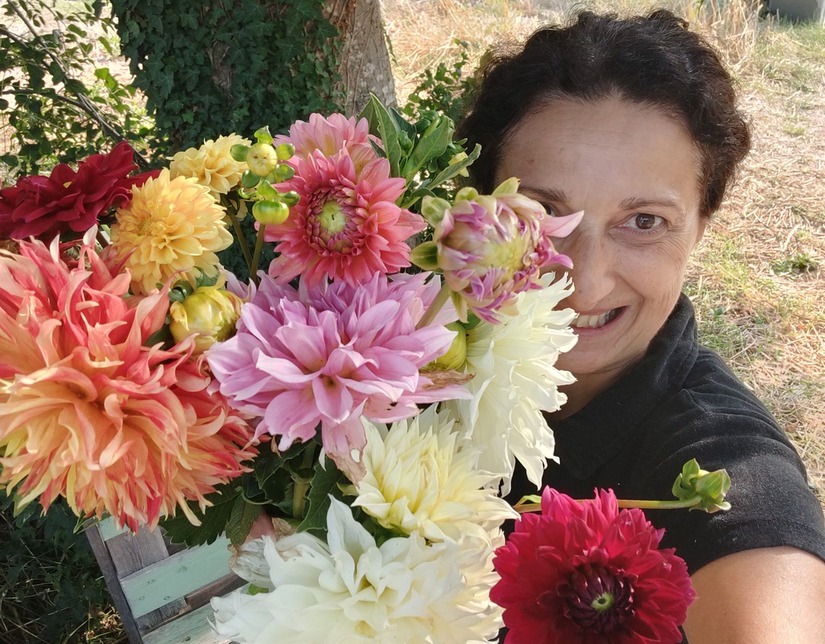By Claudia Cencini
It is not the beginning of a fairy tale, but the reality of Fiorinda, the first flower farm in Umbria, a real flower farm with cultivation and direct local sale. Let’s meet Paola Carletti, the creator of this floral oasis that makes the green heart of Italy pulsate with colours and scents.
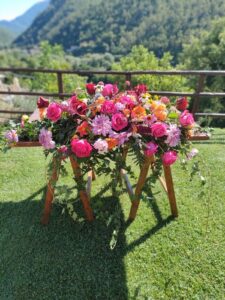 What would life be without a flower? Flowers accompany us from birth throughout our lives, just close your eyes to smell their scent even just in the memory. There are those, like Paola Carletti, who have made their love for flowers a passion that turned into a job until the birth of Fiorinda, a step away from the sources of the Clitunno of Virgilian memory, something different and more than a simple flower shop, but a dream that starts from afar and comes true for her happiness and that of her customers. Thanks to her we will discover a surprising world full of ancient charm that was born from the love for the land.
What would life be without a flower? Flowers accompany us from birth throughout our lives, just close your eyes to smell their scent even just in the memory. There are those, like Paola Carletti, who have made their love for flowers a passion that turned into a job until the birth of Fiorinda, a step away from the sources of the Clitunno of Virgilian memory, something different and more than a simple flower shop, but a dream that starts from afar and comes true for her happiness and that of her customers. Thanks to her we will discover a surprising world full of ancient charm that was born from the love for the land.
How Fiorinda was born
Paola wanted to call her floral microcosm Fiorinda in homage to her grandmother’s name. You can’t understand the fresh and innovative juice of this project without going back to Paola as a child. A story of the heart, everything starts from there, as she herself confirms: “I opened my first flower shop in Campello thirty years ago, but I felt that I needed something else, the turning point in 2018 when my father decided to divide his land among us brothers, the result of a lifetime of work as a farmer. At that point I asked him to give me the field of San Cipriano, this one where today I have built the germination greenhouse and the crops, right in the middle of the land as I like it. That field had and still has a deep meaning for my childhood memories, it is no coincidence that I named my son Federico Cipriano. My wish was fulfilled and it is here that I wanted to give birth to my Fiorinda”. Paola talks about her as if she were a creature, a second daughter and from the light of her eyes you can understand how much love she puts into the work she does. “I tried to do other things in life but the call of flowers and the earth was stronger. For me, what matters is not so much the logic of profit as an end in itself, but feeling good for what I have chosen to do”.
Password: “Bio”
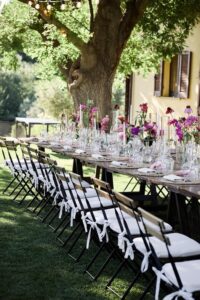 Today Paola is a satisfied woman who gets up in the morning, at the first light of dawn, and plants her flowers by herself, picks them and sells them on the spot. Her kiosk does not escape the eye of the passer-by, announced by a string of brightly coloured cyclamen and panses that peep out from the roadside. Just one look is enough to realize that it is a special place, where the care of flowers has transformed the way of growing and packaging them, in full respect of nature and the field that hosts them. This is the philosophy of the flower farm, which is linked to ancient rhythms and customs, where the use of chemical fertilizers and tractors is banned. The focus is on the flower that comes from the self-produced seed or native bulb, without violating the earth and its micro-organisms, in a sustainable and strictly “organic” habitat. “When I thought about all this I thought I was the only one – confesses Paola – but then I realized that this modus operandi in the floriculture sector is very widespread in other countries, such as the United States and Great Britain, less so in Italy where, however, it is spreading, such as in the Como area.”
Today Paola is a satisfied woman who gets up in the morning, at the first light of dawn, and plants her flowers by herself, picks them and sells them on the spot. Her kiosk does not escape the eye of the passer-by, announced by a string of brightly coloured cyclamen and panses that peep out from the roadside. Just one look is enough to realize that it is a special place, where the care of flowers has transformed the way of growing and packaging them, in full respect of nature and the field that hosts them. This is the philosophy of the flower farm, which is linked to ancient rhythms and customs, where the use of chemical fertilizers and tractors is banned. The focus is on the flower that comes from the self-produced seed or native bulb, without violating the earth and its micro-organisms, in a sustainable and strictly “organic” habitat. “When I thought about all this I thought I was the only one – confesses Paola – but then I realized that this modus operandi in the floriculture sector is very widespread in other countries, such as the United States and Great Britain, less so in Italy where, however, it is spreading, such as in the Como area.”
Few but good ones
In the case of Fiorinda, the practice of flower farming is oriented towards productions that favour quality over quantity, except for exceptions that require the use of external suppliers for orders or large-scale events. By quality we do not mean the aesthetics of the flower itself, but something deeper and more substantial. “Growing flowers as I do is not comparable to the massive productions that come from abroad, it is obvious that my flowers cannot compete in perfection with Dutch tulips rather than imported roses, but their beauty lies precisely in the rustic and authentic essence that characterizes them. If we talk about freshness, there is no competition between flowers that cross the ocean to reach our shelves and local crops, picked and sold in real time”.
Bio-wedding, what a passion!
You can smell the scent of Fiorinda’s flowers that emanates from the dew-veined petals and the smell of grass from the freshly cut stem, you can feel the aroma of earth that pervades the instantly packaged bouquets. This is why these flowers are also popular for small wedding ceremonies, where the authenticity and freshness of wild flowers and medicinal plants enhance the scenic effect of tailor-made floral decorations.
To understand what makes Fiorinda successful, part from her originality – even in the floral arrangement of “botanical” weddings with the exclusive use of organic materials – the testimony of a young bride is eloquent: “I received the most beautiful bouquet I had ever thought of, an explosion of lavender, sage and rosemary”.
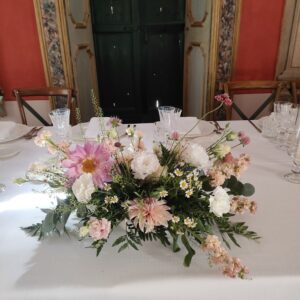
Seasonal flowers, to each his own
Fiorinda has already achieved important goals, a source of pride for her owner who, however, does not stop and looks ahead: “In a few months I have had more than positive feedback – she confirms – I think of the consultations on my flowers requested by other flower designers, but the greatest satisfaction is having been able to sell only flowers of my own production last summer”. A peek at the land behind you can still see many varieties in bloom that make the field look like an impressionist painting.
“Until a few weeks ago there were sunflowers – she tells us – in this period dahlias, cornflowers, zinnias, scabiose, cosmos and other seasonal ornamental plants are the most popular. Perennials such as monarda, echinaceae and rudbeckia deserve a separate mention, which require less care as they are resistant to heat and cold, some require little water contributing to water savings”.
A “plastic free” floriculture
In the use of materials functional to the activity, Fiorinda does not compromise in the choice of products that must be as free as possible from chemical additives, plastic accessories or pollutants. Consistent with the eco-sustainable choice of healthy and environmentally friendly floriculture, no wrappers are used for plastic packaging, not even the sponges usually used for floral compositions that contain non-biodegradable microplastics. From a “total organic” perspective, Fiorinda adheres to the ‘Slow Flowers Italy’ association, which promotes alternative floriculture practices in contrast to massive imports from countries that encourage child exploitation or polluting fertilization.
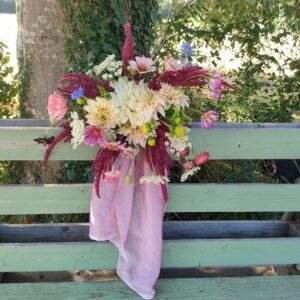
“No dig” method: from the field to the pot
At Fiorinda the flower is only the tip of the iceberg, behind it there is a hard work made of effort, experience and training put in place by Paola Carletti, who faces it with that enthusiasm that makes it seem lighter, a 360-degree activity that starts from working the soil to the sound of hoe and sweat. In October, after the summer flowering, the soil is prepared with the “No Dig” method. In addition to the hoe, only the use of the Grelinette, an ergonomic bio-fork that only affects the surface layer of the soil, is allowed. From October to March, the soil treated with compost and organic wood chips is covered with a concealing sheet that does not allow the grass to grow. The rest comes from the skilled hands of Paola who gives body and shape, with originality and mastery, to floral creations that are never taken for granted, which convey all her love for flowers.
Fiorinda Flower Farm
Viale Fonti del Clitunno, Campello sul Clitunno (Pg)
Tel.: 320 1681633
